Related Research Articles
The Volunteer Political Party (VPP) was a loyalist political party launched in Northern Ireland on 22 June 1974 by members of the then recently legalised Ulster Volunteer Force (UVF). The Chairman was Ken Gibson from East Belfast, an ex-internee and UVF chief of staff at the time. The success of the Ulster Workers Council Strike had shown some UVF leaders the political power they held and they sought to develop this potential further. The UVF had been banned by the Government of Northern Ireland in 1966, but was legalised at the same time as Sinn Féin by Labour Secretary of State Merlyn Rees in April 1974 in order to encourage a political path for Loyalist and republican paramilitary groups.
The Ulster Protestant Volunteers was a loyalist and Reformed fundamentalist paramilitary group in Northern Ireland. They were active between 1966 and 1969 and closely linked to the Ulster Constitution Defence Committee (UCDC) and Ulster Volunteer Force (UVF), established by Ian Paisley and Noel Doherty in 1966.
The Ulster Constitution Defence Committee (UCDC) was established in Northern Ireland in April 1966 as the governing body of the loyalist Ulster Protestant Volunteers (UPV). It coordinated parades, counter demonstrations and paramilitary activities in order to maintain the status quo of the government, lead a campaign against the reforms of Terence O'Neill and stymie the civil rights movement.

Ulster loyalism is a strand of Ulster unionism associated with working class Ulster Protestants in Northern Ireland. Like other unionists, loyalists support the continued existence of Northern Ireland within the United Kingdom, and oppose a united Ireland independent of the UK. Unlike other strands of unionism, loyalism has been described as an ethnic nationalism of Ulster Protestants and "a variation of British nationalism". Loyalists are often said to have a conditional loyalty to the British state so long as it defends their interests. They see themselves as loyal primarily to the Protestant British monarchy rather than to British governments and institutions, while Garret FitzGerald argued they are loyal to 'Ulster' over 'the Union'. A small minority of loyalists have called for an independent Ulster Protestant state, believing they cannot rely on British governments to support them. The term 'loyalism' is usually associated with paramilitarism.
The Ulster Workers' Council was a loyalist workers' organisation set up in Northern Ireland in 1974 as a more formalised successor to the Loyalist Association of Workers (LAW). It was formed by shipyard union leader Harry Murray and initially failed to gain much attention. However, with the full support of the Ulster Defence Association (UDA) the UWC became the main mobilising force for loyalist opposition to power-sharing arrangements.

Augustus Andrew Spence was a leader of the paramilitary Ulster Volunteer Force (UVF) and a leading loyalist politician in Northern Ireland. One of the first UVF members to be convicted of murder, Spence was a senior figure in the organisation for over a decade.
Tara was an Ulster loyalist movement in Northern Ireland that espoused a brand of evangelical Protestantism. Preaching a hard-line and somewhat esoteric brand of loyalism, Tara enjoyed some influence in the late 1960s before declining amid a high-profile sex abuse scandal involving its leader William McGrath.
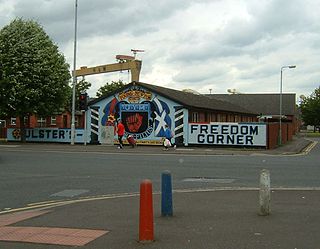
The Ulster Young Militants (UYM) are considered to be the youth wing of the Ulster Defence Association (UDA), an Ulster loyalist paramilitary group in Northern Ireland. Commonly known as the Young Militants or UYM, the group formed in 1974 when the Troubles were at their height. Their motto is "terrae filius", Latin for "son of the land". Their numbers are unknown, but are mainly concentrated in the Belfast area, particularly east and south Belfast.
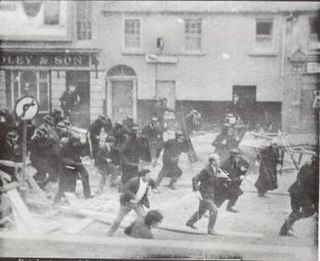
During 12–16 August 1969, there was an outbreak of political and sectarian violence throughout Northern Ireland, which is often seen as the beginning of the thirty-year conflict known as the Troubles. There had been sporadic violence throughout the year arising out of the Northern Ireland civil rights campaign, which demanded an end to discrimination against Catholics and Irish nationalists. Civil rights marches had been attacked by Protestant loyalists, and protesters often clashed with the Royal Ulster Constabulary (RUC), the overwhelmingly Protestant police force.
Ulster Protestant Action (UPA) was an Ulster loyalist political party and Protestant fundamentalist vigilante group in Northern Ireland that was founded in 1956 and re-formed as the Protestant Unionist Party in 1966.
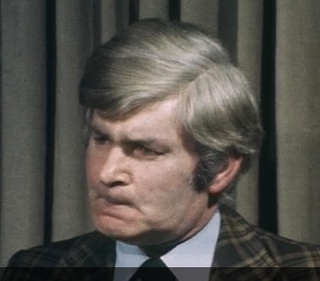
John Dunlop McKeague was a Northern Irish loyalist and one of the founding members of the paramilitary group the Red Hand Commando in 1970. A number of authors on the Troubles in Northern Ireland have accused McKeague, a homosexual paederast, of involvement in the Kincora Boys' Home scandal but he was never convicted. He was shot dead by the Irish National Liberation Army (INLA) in Belfast in January 1982.
Andrew Tyrie is a Northern Irish loyalist paramilitary leader who served as commander of the Ulster Defence Association (UDA) during much of its early history. He took the place of Tommy Herron in 1973 when the latter was killed, and led the organisation until March 1988 when an attempt on his life forced him to resign from his command.
H. David "Davy" Payne was a senior Northern Irish loyalist and a high-ranking member of the Ulster Defence Association (UDA) during the Troubles, serving as brigadier of the North Belfast Brigade. He was first in command of the Shankill Road brigade of the Ulster Freedom Fighters (UFF), which was the "cover name" of the militant branch of the UDA. The group was responsible for a series of abductions and killings of mostly Catholic civilians in the early 1970s.
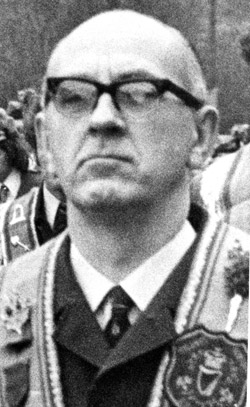
William Worthington McGrath was a loyalist from Northern Ireland who founded the far-right organisation Tara in the 1960s, having also been prominent in the Orange Order until his expulsion due to his paedophilia. A house master in Kincora Boys' Home in East Belfast, in 1981 he was jailed for four years for paedophile activities at the Home.
The Battle of St Matthew's or Battle of Short Strand was a gun battle that took place on the night of 27–28 June 1970 in Belfast, Northern Ireland. It was fought between the Provisional Irish Republican Army (IRA), and Ulster loyalists in the area around St Matthew's Roman Catholic church. This lies at the edge of the Short Strand, a Catholic enclave in a mainly-Protestant part of the city. Violence had erupted there, and in other parts of Belfast, following marches by the Orange Order. The battle lasted about five hours and ended at dawn when loyalists withdrew. The British Army and police were deployed nearby but did not intervene. Three people were killed and at least 26 wounded in the fighting, while another three were killed in north Belfast.
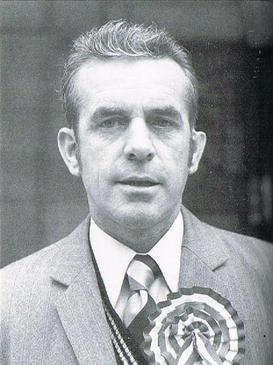
Kenneth Gibson was a Northern Irish politician who was the Chairman of the Volunteer Political Party (VPP), which he had helped to form in 1974. He also served as a spokesman and Chief of Staff of the loyalist paramilitary organisation, the Ulster Volunteer Force (UVF).

The Woodvale Defence Association (WDA) was an Ulster loyalist vigilante group in the Woodvale district of Belfast, an area immediately to the north of the Shankill Road.
William Elliot was a former Northern Irish loyalist who served as brigadier of the Ulster Defence Association's (UDA) East Belfast Brigade in the 1980s.
Billy Spence was a loyalist activist in Northern Ireland. A native of the Shankill Road area of Belfast, Spence was a leading figure with both Ulster Protestant Action and the Ulster Volunteer Force.
Noel Docherty was a Northern Irish loyalist activist who was close to Ian Paisley during Paisley's early years in politics. He served as leader of the Ulster Protestant Volunteers and was imprisoned for his involvement in procuring explosives for that organisation.